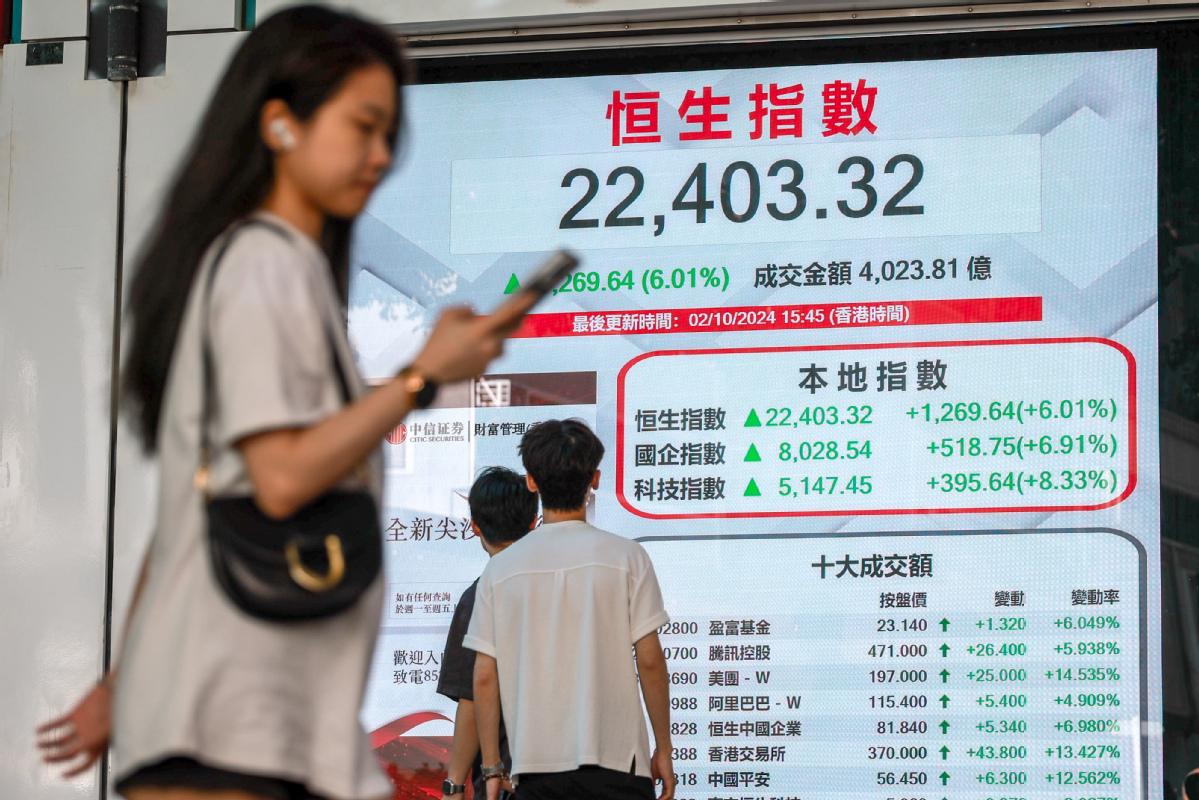
 0 Comment(s)
0 Comment(s) Print
Print E-mail China Daily, October 3, 2024
E-mail China Daily, October 3, 2024

Pedestrians pass an electronic board showing Hong Kong's Hang Seng Index in Tsim Sha Tsui on Wednesday. The index has soared in the past six days to reach a 20-month high.[ANDY CHONG/CHINA DAILY]
Hong Kong stocks surged for a sixth day on Wednesday, amid growing optimism that Beijing's sweeping stimulus package could reboot the world's second-largest economy and fix the country's property market.
The benchmark Hang Seng Index surged 6.2 percent on Wednesday, closing at 22,443.73 points, its highest for the past 20 months.
The Hang Seng China Enterprises Index rose 7.08 percent. The Hang Seng Property Index, a gauge of the property sector, soared 47 percent, while Hang Seng Tech Index, representing the 30 largest technology firms listed in the city, jumped 8.53 percent.
The rise has brought Hong Kong stocks into bull-market territory underpinned by positive policy signals and combined with previous low valuations, said Yang Delong, chief economist at First Seafront Fund in Shenzhen, Guangdong province.
The recent euphoria has presented investors with a key question as to how long the current rally will continue.
Confident, Yang said the policy measures have "completely" reversed global investors' pessimistic outlook toward Chinese equities. China's broader-than-expected policy blitz revealed last week was the most daring in decades. It includes a reduction in the reserve requirement ratio and existing mortgage rates as well as 800 billion yuan ($114.9 billion) of liquidity support, among other measures. Four first-tier cities also eased homebuying curbs.
Some experts have taken a relatively more cautious tone, saying there's still some room for a short-term rebound, but the market is still watching the nation's fiscal efforts and economic data coming up in the long run.
Jason Chan, a senior investment strategist at East Asia Securities, said that sustained growth needs the policy campaign announced last week to be matched by appropriate follow-up in fiscal policies.
Also, policy packages should lead to improvement in the country's fundamentals, Chan said.
Gary Ng, a senior economist at French investment bank Natixis, said that although the stimulus package is positive in stabilizing the economy and the financial market, a full turnaround depends on "whether household disposable income and corporate profit growth can pick up".
"In particular, home sales will need to recover beyond first-tier cities to show a broad-based recovery. China will need to cut interest rates further and relax more regulations to make this happen, and sending a strong signal to reduce policy risks is equally vital," Ng said.
On what's next for equities, he added that it is questionable whether the current magnitude of improved outlook can override pressures linked to investors' mindset toward profit-taking or breaking even, especially among those who brought the shares to a high level a few years ago.
A cautious note amid the trading frenzy makes sense as investors have been burned by false starts before. The benchmark had witnessed a surge of more than 20 percent to nearly 20,000 points from April to May — only to have most of those advances wiped away due to the country's slower-than-expected recovery.
According to China International Capital Corporation's research report published last Saturday, long-term investors globally are mostly in a wait-and-see mode. Analysts at the company cited communication with clients, saying that long-term foreign capital is more focused on reducing underweight positions to prevent significant underperformance rather than fundamentally raising allocations.